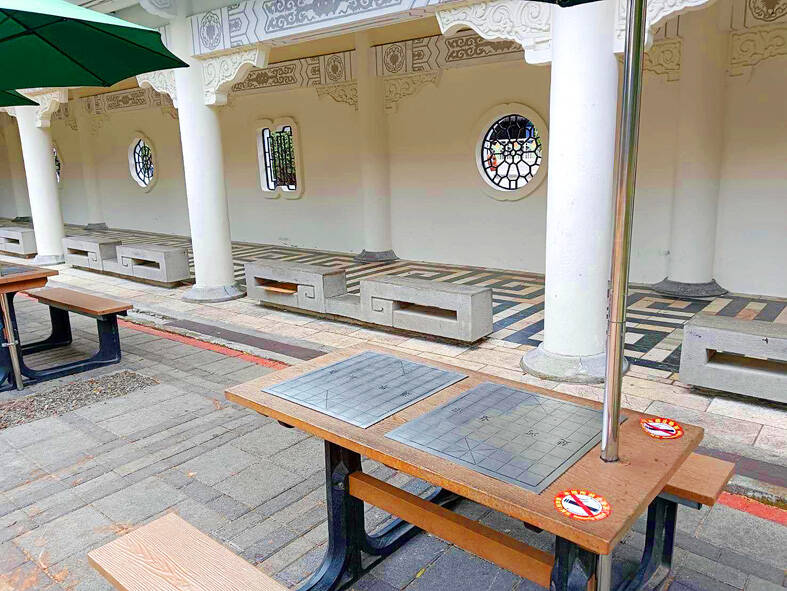Smoking is now prohibited at the Chiang Kai-shek Memorial Hall, the hall’s management office said yesterday, after a celebrity accused it of removing trees to establish a smoking area.
The office said it would no longer permit smoking in previously designated areas, effective immediately, following a complaint a day earlier by entertainer Tai Chih-yuan (邰智源).
It also denied that trees were removed to create a smoking area, saying it cut down tall trees with brown root rot to prevent them from falling over and causing injury.

Photo courtesy of the Chiang Kai-shek Memorial Hall
The soil was also disinfected to prevent the disease from spreading, it added.
Taipei Mayor Chiang Wan-an (蔣萬安) said the Taipei City Government would help enforce the no smoking policy.
Regarding a call by the John Tung Foundation to fine the hall for establishing smoking areas in contravention of regulations, the Taipei Department of Health said it had not received any complaints.
Although the memorial is a cultural establishment and therefore should be entirely smoke-free under the Tobacco Hazards Prevention Act (菸害防治法), the smoking areas it previously established did not exceed half of all outdoor spaces and were in line with regulations, Health Promotion Division Director-General Lin Hsueh-lan (林雪蘭) said.
In a statement released yesterday, Tai called on the Ministry of Culture to “do something cultural” about the issue.
He urged the ministry to put up signs in Chinese and English at the hall’s entrances stating that smoking is banned.
Responding to comments about upholding smokers’ rights, Tai suggested setting up walled-off spaces in front of the National Central Library for smokers, adding that funding for the areas should come from tobacco health and welfare surcharges.
If national sites adopt such policies, local governments would follow suit and implement similar facilities at outdoor locations, such as swimming pools or tracks, Tai said.
The law is only effective to a limit, and it is up to the public to follow the rules, Tai said, adding that a nation is powerful not just because of the vastness of its territory or strength of its military, but also because of the strength of character of its citizens.
Additional reporting by Chiu Yi-chin

Alain Robert, known as the "French Spider-Man," praised Alex Honnold as exceptionally well-prepared after the US climber completed a free solo ascent of Taipei 101 yesterday. Robert said Honnold's ascent of the 508m-tall skyscraper in just more than one-and-a-half hours without using safety ropes or equipment was a remarkable achievement. "This is my life," he said in an interview conducted in French, adding that he liked the feeling of being "on the edge of danger." The 63-year-old Frenchman climbed Taipei 101 using ropes in December 2004, taking about four hours to reach the top. On a one-to-10 scale of difficulty, Robert said Taipei 101

Nipah virus infection is to be officially listed as a category 5 notifiable infectious disease in Taiwan in March, while clinical treatment guidelines are being formulated, the Centers for Disease Control (CDC) said yesterday. With Nipah infections being reported in other countries and considering its relatively high fatality rate, the centers on Jan. 16 announced that it would be listed as a notifiable infectious disease to bolster the nation’s systematic early warning system and increase public awareness, the CDC said. Bangladesh reported four fatal cases last year in separate districts, with three linked to raw date palm sap consumption, CDC Epidemic Intelligence

Taiwanese and US defense groups are collaborating to introduce deployable, semi-autonomous manufacturing systems for drones and components in a boost to the nation’s supply chain resilience. Taiwan’s G-Tech Optroelectronics Corp subsidiary GTOC and the US’ Aerkomm Inc on Friday announced an agreement with fellow US-based Firestorm Lab to adopt the latter’s xCell, a technology featuring 3D printers fitted in 6.1m container units. The systems enable aerial platforms and parts to be produced in high volumes from dispersed nodes capable of rapid redeployment, to minimize the risk of enemy strikes and to meet field requirements, they said. Firestorm chief technology officer Ian Muceus said

MORE FALL: An investigation into one of Xi’s key cronies, part of a broader ‘anti-corruption’ drive, indicates that he might have a deep distrust in the military, an expert said China’s latest military purge underscores systemic risks in its shift from collective leadership to sole rule under Chinese President Xi Jinping (習近平), and could disrupt its chain of command and military capabilities, a national security official said yesterday. If decisionmaking within the Chinese Communist Party has become “irrational” under one-man rule, the Taiwan Strait and the regional situation must be approached with extreme caution, given unforeseen risks, they added. The anonymous official made the remarks as China’s Central Military Commission Vice Chairman Zhang Youxia (張又俠) and Joint Staff Department Chief of Staff Liu Zhenli (劉振立) were reportedly being investigated for suspected “serious